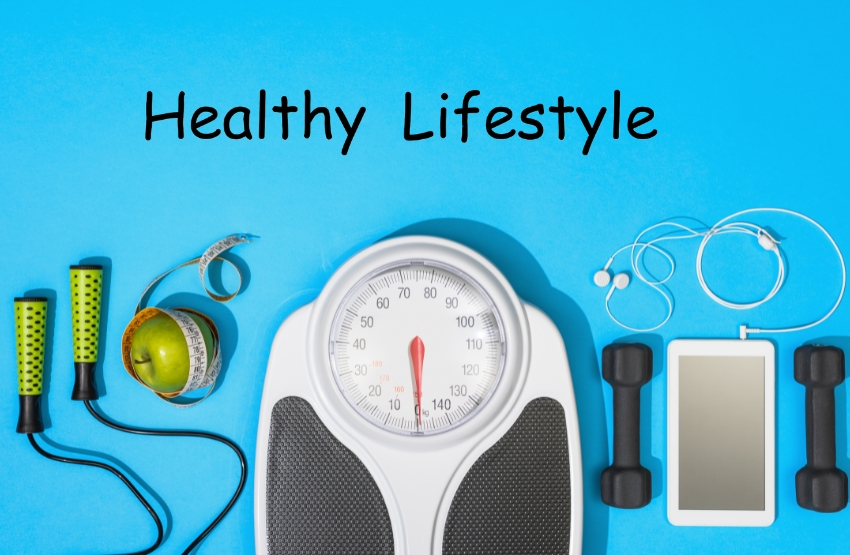According to the U.S. Census Bureau, 76.4 million baby boomers are in the United States. People in this category include Americans who were born between 1946 and 1964. As a result of advancements in medicine, elders are surviving longer. By adopting healthy behaviors into your daily routine, you can lower your risk of developing diabetes, heart disease, and even cancer. Maintaining a healthy lifestyle takes consistent effort.
Having some advice on how to live a better life is beneficial since there are several advantages to healthy living. Continue reading below for 10 ways to maintain a healthy lifestyle if you want to find out how to have a better quality of life.
1. Eat a balanced diet
Make sure to eat various varieties of food:

Eat a variety of foods, including whole grains, fruits, vegetables, legumes, nuts, and seeds. Eat 400 grams (or at least 5 servings) of fruits and vegetables per day; preferably, eat seasonal, fresh food. If you’re not a vegetarian, make fatty fish a part of your diet since omega-3 fatty acids can reduce inflammatory disorders like heart disease.
Reduce the amount of salt:

You should not consume more than one gram (or teaspoon) of salt per day. Cook with less salt. Lower the amount of high-sodium condiments you add to your food, and stay away from salty snacks. Lowering your diet’s salt intake will lower the chances of high blood pressure.
Reduce the amount of sugar you consume:

Don’t consume more sugar than 50 grams, or around 12 teaspoons, each day. Avoid candy, snacks, and sugary drinks like soda and fruit juice. Eating less sugar reduces your risk of developing heart disease, stroke, diabetes, and certain types of cancer.
Stay away from unhealthy fats:

Fats should account for no more than 30% of your total calorie intake. Consume unsaturated fats such as avocados, nuts, seeds, seafood, and olive oil. Trans fats in baked goods and prepackaged, ready-to-eat meals, as well as saturated fats in red meat, butter, and cheese, are to be avoided.
2. Stay hydrated
Drinking plenty of water is one of the most simple and effective ways to maintain good health. Try to drink eight glasses or more of water per day. Maintaining sufficient water intake facilitates digestion, supports good skin, and helps control body temperature. In addition, it aids in the removal of waste materials and toxins and protects against long-term diseases, including kidney stones, constipation, and headaches.

3. Stop Smoking and Alcohol
By stopping smoking and alcohol permanently, you can lower your chances of heart failure, strokes, cancer, and aging. Yes, this will contribute to enhancing your general well-being and health. Smoking in males can cause erectile dysfunction and lead to atherosclerosis. Excessive consumption of alcohol can cause liver cancer and other chronic diseases. It is advisable to discuss the best ways to stop smoking with your physician. To help you stop, there are many options: medication, therapy, and nicotine gum and patches.

4. Get Regular Exercise
Exercise is essential for maintaining a healthy lifestyle and avoiding health problems. Frequent physical activity has several advantages that can significantly improve general health. In addition to helping to control weight, exercise lowers the chance of developing long-lasting diseases, including diabetes, heart disease, and some forms of cancer. It also enhances mental health by lowering stress, anxiety, and depressive symptoms.
Make sure to exercise for at least 150 minutes every week, or 30 minutes per day, five days a week. The goal is to stay physically active, whether by swimming, walking, running, or doing a Pilates routine at home.
Exercise increases physical strength, flexibility, and balance while promoting the growth and maintenance of strong bones, muscles, and joints.

5. Practice of Good Hygiene
Maintaining proper hygiene keeps your body hygienic and clear of pathogenic microorganisms while also preventing the spread of diseases and germs. It is important to regularly wash your hands with soap and water, especially before eating and after using the restroom. Flossing frequently and brushing twice a day can help prevent gum disease and decay. Taking regular showers and washing your skin with mild soap will also help to keep your skin clean. If you keep your body clean and germ-free, you’ll feel better and stay healthy.

6. Get Enough Sleep
Getting enough sleep is an essential part of maintaining a healthy lifestyle. It is essential for both physical and mental health. It helps in hormone regulation, mood enhancement, energy production, immune system regulation, and cognitive function enhancement.
Try to sleep for 7 to 9 hours per night. If you have problems falling asleep, consider implementing proper sleep hygiene, which includes avoiding gadgets just before bed and setting a regular wake-up and bedtime.

7. Reduce the Stress Level
There are several methods you may attempt to use to lower your stress levels until you find something that works for you. Sketching, working out, gardening, writing, socializing with others, listening to music, meditating, praying, and sketching are all common strategies for relieving stress. When you discover something that relieves stress, you’ll discover that it also enhances your emotional and physical well-being and self-esteem. Thinking positively is a fantastic way to change your perspective on life.

8. Make Time for your Hobbies
Enjoyable hobbies and pastimes not only provide you with a sense of achievement but also ease tension and encourage relaxation. Physical activities such as gardening and sports can also improve a person’s overall fitness. Whether it’s a creative endeavor like painting, ceramics, or music, or an athletic pastime like hiking or sports, having a diverse range of hobbies can enhance your life and improve your overall health.

9. Maintain Social Connection
Having a supportive social network is essential for a person’s well-being and mental health. It is possible to lower stress and raise feelings of security and pleasure by surrounding yourself with supportive friends and relatives.
Socializing and taking part in group activities may also encourage good habits like eating healthily and keeping a regular sleep schedule, as well as chances for physical activity.
Good relationships are also a source of emotional support, which is important when things are hard. Try to maintain frequent relationships with friends and family.

10. Go for the Regular checkups from your Specialist Audiologist, Dentist, or Optometrist
People worry about hearing loss more and more as they get older. This is especially true for those who have been subjected to exceptionally loud noises at work or during an incident. An older adult can get their hearing examined by going to an audiologist. A person may make sure they can hear correctly, even if they use a hearing aid. Hearing is crucial for understanding your environment, other people, and yourself. You also need to be able to speak quietly enough for other people to hear you.
It may surprise you to learn that, with proper dental care, an older adult can still have excellent oral health.
This includes flossing, brushing, eating a balanced diet, drinking water, and scheduling a cleaning appointment with their dentist every six months.
Regarding eyesight, most people become aware of changes in their vision around the age of 50. This might involve an ongoing decline in their vision for small text or detailed items. During annual eye checkups, an optometrist can screen for common visual problems, including cataracts and glaucoma.

Conclusion
Adopting these 10 ways to maintain a healthy lifestyle benefits improves your vitality and general well-being considerably. Regular exercise, a well-balanced diet, enough sleep, stress reduction, staying hydrated, and making thoughtful decisions may all help you develop a long-lasting and satisfying healthy lifestyle. Remember that even little adjustments made now can have a big impact on your happiness and health later on.
FAQs
What are Healthy lifestyle apps free?
There are the following Healthy Lifestyle free apps, such as
MyFitnessPal
Lifesum
Headspace
Sleep Cycle
Clam
Insight Timer
Why do we always have good health?
Maintaining a healthy lifestyle can help prevent long-term illnesses and chronic conditions. Take good care of your body to sustain a healthy lifestyle. Healthy lifestyle examples include maintaining your weight, staying hydrated, reducing your screening time, getting proper sleep, etc.
What are the five healthy lifestyle habits?
Here are five suggestions for leading a healthy lifestyle:
Make a proper diet Plan.
Limit your intake of alcohol and caffeine.
Drink 8 glasses of water each day
Eat fresh and raw food.
Exercise regularly.
Participate in moderate-intense aerobic exercise for 150 minutes each week, or 30 minutes most days.
Sleeping, socializing, etc.
How can children maintain their health?
Here are a few tips that you can follow with your children to maintain their health.
Involve them in healthy activities to make them active
Go to the parks with the family and kids
Keep your daily computer, video game, and television time to one or two hours.
Put enjoyment above skills.
Encourage your kids to play outside together.
Use enjoyable exercise as a reward.
Incorporate daily routines into your schedule.

